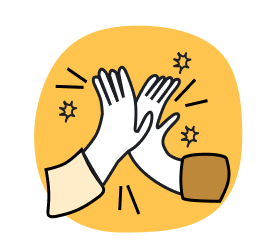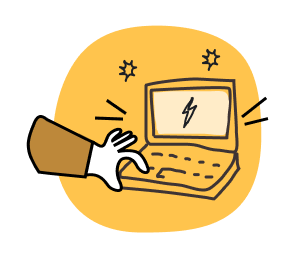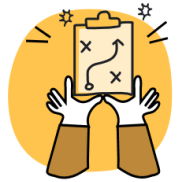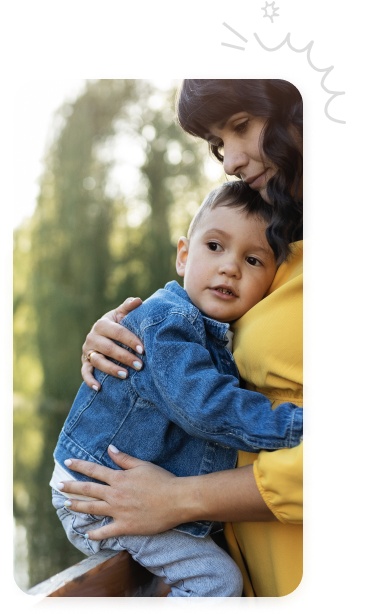Seeing through the symptoms
We combine the best clinical acumen with the latest technology to uncover the root cause of observed symptoms and behavior.

Trauma exposure
Exposure to a traumatic event or abuse

Re-experiencing trauma
in the form of memories, nightmares, flashbacks, or dissociative episodes.

Avoidance behavior
Persistent avoidance of stimuli associated with the traumatic event

Attention!!!
If your child has recurrent suicidal thoughts, they may be at risk and require immediate help.
Please call 911 or visit the nearest ER for assistance

Did you know?
Young children with PTSD may describe their flashbacks as auditory and visual hallucinations, which can be misinterpreted as symptoms of psychosis.

Uncertain about the diagnosis?
OUR DIAGNOSTIC PROCESS
Understanding your unique mental health needs
Each individual is different. And so is our mental health program that supports unique needs of every member.

1
Online psychiatry assessment
Take a comprehensive and interactive assessment of your child’s psychiatric symptoms and share relevant medical and family history.

2
Psychiatric evaluation
Gain a thorough assessment of your child’s emotional, cognitive, and behavioral health from a board-certified expert.

3
Treatment planning
Actively collaborate with your child’s provider to develop an effective treatment plan tailored to your child’s needs and get started on your wellness journey.
We place the child and it’s family at the centre of our care experience
Self-guided care
Empower Your Child with Self-Guided care for PTSD, enabling them to take control of their well-being.

 Imagery Rehearsal Therapy
Imagery Rehearsal Therapy
Guide children to rewrite the content of their nightmares into positive scenarios during the day. Encourage them to visualize these revised dreams before going to sleep, helping to reduce the frequency and intensity of nightmares.
 Safe space visualization
Safe space visualization
Guide children to form a sensory-rich safe haven in their minds for distressing times or flashbacks. This technique offers grounding and protection in challenging moments.
 Grounding objects or anchors
Grounding objects or anchors
Introduce grounding objects for kids during distress or flashbacks. Whether tangible or mental, these anchors refocus them to the present, emphasizing sensory awareness for stability.
Parents’ Guide
Facilitating your active role in your child’s incredible journey to mental well-being.
 Understand depression
Understand depression
Provide parents with detailed information about PTSD, including symptoms, triggers, and impact on their child’s daily life, fostering recognition and empathy for their child’s experiences.
 Create a supportive Environment
Create a supportive Environment
Assist parents in creating a nurturing and safe environment at home that encourages open communication, validation of emotions, and provides a sense of stability. This includes fostering a non-judgmental atmosphere and offering support to their child during difficult times.
 Practice self-care
Practice self-care
Guide parents on how to prioritize self-care for resilience. Engage in self-nurturing activities, seek support, and manage stress. This fortifies you to better aid your child’s mental health.

Mindweal Resources
Mental health resources just for you
Don’t have all the anwers yet?
That’s okay! As we’ve put together easy guides and helpful articles just for you.

Blog
Your guide to mental health conditions in children with ADHD

Blog
What is an advanced ADHD testing ? Exactly what to expect?

Self-Care and Healthy Habits
My child has ADHD and has gained weight. What can I do?

After-hours Crisis Care
Our emergency same-day appointments minimize after-hours crises. But, if you’re in crisis outside our working hours (Mon to Fri from 8 AM to 5 PM), call 911 or visit the nearest ER for immediate help and safety assessment.

Our psychiatric experts will help you find the right path forward for your child.








 Personalized medication management
Personalized medication management Comprehensive support strategies
Comprehensive support strategies
 Clinically proven
Clinically proven Science-backed
Science-backed Improve well-being
Improve well-being
 Tailored prescriptions
Tailored prescriptions Medication monitoring
Medication monitoring Effective communication
Effective communication
 Supportive environment
Supportive environment Self-help toolkits
Self-help toolkits Any-time guidance
Any-time guidance